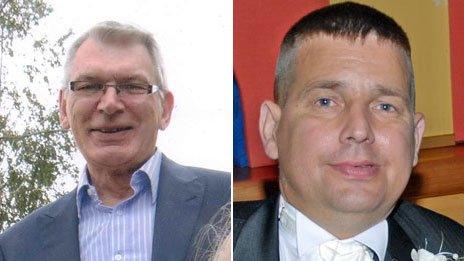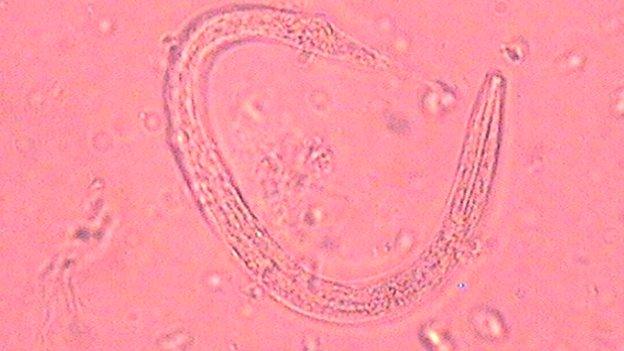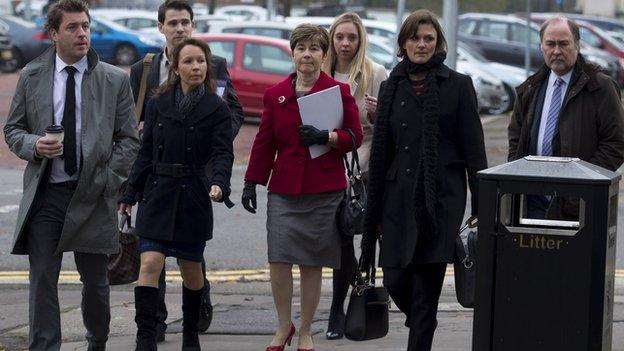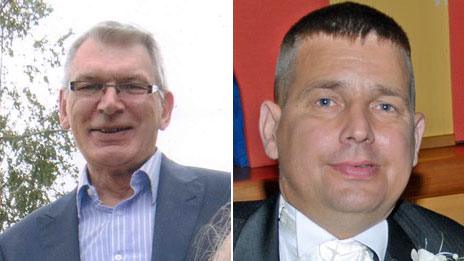Kidney transplant surgeon apologises after patients died
- Published
Argiris Asderakis wished he could 'turn the clock back'
A surgeon has apologised after carrying out a transplant which resulted in the deaths of two patients.
Argiris Asderakis told Cardiff Coroner's Court he was "terribly sorry" and wished he could "turn the clock back".
Robert Stuart, 67, of Cardiff, and Darren Hughes, 42, of Bridgend, died after being given kidneys infected with meningitis-causing parasitic worms.
Doctors knew the donor had died from meningitis before accepting the organs.
Mr Asderakis told the inquest on Wednesday: "I'm terribly sorry for what happened, I wish I could turn the clock back in hindsight, but hindsight is a great thing for us all."

The transplant was the first for Robert Stuart and the third for Darren Hughes
The consultant said he would now like specialist advice to be sought in difficult cases.
The transplants took place at Cardiff's University Hospital of Wales last year.
Mr Asderakis said the 39-year-old alcoholic donor had undergone a five-day treatment of antibiotics before his death.
"It was most likely it [the cause of the meningitis] would be covered by the treatment so transmission would not take place," he said.
He said his decision was based on the suitability of the organ based on the donor's medical history and information provided by his partner to NHS Blood and Transplant.
"In hindsight, in cases of great difficulty, we should try to find the most expert advice on the night," said Mr Asderakis.
After speaking to specialist transplant nurse Dawn Chapman, Mr Asderakis was confident the transplants could go ahead.
He said even though the kidneys showed signs of dysfunction, this was not uncommon. He expected to the organ to recover and perform normally.

Halicephalobus parasite

The donated kidneys were infected with a parasitic worm
The parasitic worm halicephalobus lives in soil, manure and compost
It infects animals and humans, but this is still incredibly rare
There have been only a handful of cases in humans since the infection was first described in 1954 by a researcher called Stefanski
It is unclear how the worm gets into the body - it could be by ingestion of its eggs or it entering through a break in the skin
Once inside, it can multiply and invade tissues such as the brain and kidneys
Doctors diagnose it by looking at tissue samples, but since it is so rare it is not something that will be top of their check list
The problem may only become apparent after a post-mortem examination

Mr Asderakis also said a hospital in Leeds, which had refused the kidneys, later said, on the balance of risk, it should have accepted them.
"This case highlights that no-one could have predicted the first human-to-human transmission of a bug that no-one knew of before," said Mr Asderakis.
The inquest heard Mr Hughes, who died on 17 December, had undergone two previous transplants and was not eligible to receive 90% of organs available because he had anti-bodies in his blood.
Mr Stuart was prioritised because of his age.
The inquest was earlier told organs from a donor with meningitis could still be transplanted to patients.

Ian Hughes, left, arrives with his daughter, Vanessa Gordon, and wife Jackie, far right

Robert Stuart's widow, Judith, carries documents into the inquest, surrounded by family
Anthony Clarkson from NHS Blood and Transplant said donor families were asked about their health and lifestyle history.
The donor in this case had his liver, heart and lungs rejected because of his "significant alcohol history" and previous hospital admissions for jaundice.
Mr Clarkson said UHW was aware the donor's kidneys had been rejected by five other centres before being offered to them.
He said a hospital's decision whether or not to accept an organ was made on fact "not on other people's decision to accept or decline".
'Another surgeon's opinion'
The fact other hospitals rejected the organs was "no more than evidence of another surgeon's opinion".
On Tuesday, the court heard post-mortem examinations revealed both men had the deadly parasitic worm halicephalobus in their bodies after their transplants.
Pathologist Fouad Alchami said the primary cause of death for both men was meningoencephalitis - a form of meningitis - caused by the presence of the worms.
The hearing has been adjourned until December.
- Published18 November 2014

- Published14 November 2014

- Published14 November 2014

- Published17 November 2014
